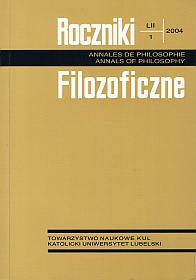The City of Soul in Philo of Alexandria
Abstract
The aim of this article is to analyze the Philonic notion of “the city of soul” which Philo uses in his commentary on the Septuagint, and especially in his two treatises: De confusione linguarum (107-109, 196) and De posteritate Caini (52-62). First the exegetic context and allegorical method are examined, including the biblical verses (Gen. 11,1-9; Ex. 4,17) and the way Philo interprets them. It can be seen how the biblical motives are modified by him and subordinated to the external conception of the city that he probably draws from the Greek or Hellenistic notions, in particular the conception of polis understood simultaneously as an actual city and as its legal constitution. Then the structure of the psychic or moral city is analyzed, including its “buildings” (and “walls”), “habitants” and “laws,” which are allegorical presentations for the moral function of language, virtues or vices and laws or constitution of the inner city. Although Philo’s allegorical interpretation is here succeeded only to a certain degree due to his difficulties in clear distinguishing the moral components of the soul, the pattern of the city appears to be a useful exegetical tool in bringing out important aspects of moral life. In the last place, the author reconstructs Philo’s ethical views present in his allegoric commentary. The “city of soul” should be regarded mainly as its moral state, taken in its dynamic or static dimension. The moral qualification of this state exclusively depends upon soul’s attitude towards God who is the source of every good, virtue and the freedom of choice. Therefore, main virtues of sage are knowledge coming from God and piety towards him; and his internal “laws” are God’s laws. A vicious man is standing on the opposite side; he is ruled by the pride and forgets God, deprives himself of freedom and lets the irrational mob of vices master him, submitting himself to the needs of his senses and the body.
References
Beckaert A.: Introduction, [w:] Philon d’Alexandrie, De praemiis et poeniis. De exsecrationibus, Paris 1961.
Barraclough R.: Philo’s Politics. Roman Rule and Hellenistic Judaism, „Aufstieg und Niedergang der römischen Welt”, II. 21 (1984), s. 417-553.
Kahn J. G.: przypisy, [w:] Philon d’Alexandrie, De confusione linguarum, Paris 1963.
Méasson A.: przypisy, [w:] Philon d’Alexandrie, De sacrificiis Abelis et Caini, Paris 1966.
Osmański M.: Filon z Aleksandrii – wprowadzenie do badań, „Roczniki Filozoficzne”, 51 (2003), z. 1, s. 349-401.
Pelletier A.: Les passions à l’assaut de l’âme d’après Philon, „Revue des études grecques”, 78 (1965), s. 52-60.
Runia D. T.: Polis and Megalopolis. Philo and the Founding of Alexandria, „Mnemosyne”, 42 (1989), s. 398-412.
Runia D. T.: The Idea and the Reality of the City in the Thought of Philo of Alexandria, „Journal of the History of Ideas”, 61 (2000), s. 361-379.
Copyright (c) 2004 Roczniki Filozoficzne

This work is licensed under a Creative Commons Attribution-NonCommercial-NoDerivatives 4.0 International License.





